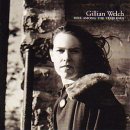Before Christmas, Dervala and I discovered a shared relish for Emmylou Harris’s Wrecking Ball album. It’s a quiet masterpiece, Daniel Lanois’ luminous production cradling a clutch of fine songs from a generation of great writers: Steve Earle, Gillian Welch, Lucinda Williams and more. Dervala kindly sent me a compilation featuring some of Emmylou’s influences—along with a challenge to write something about these performers.
 Gillian Welch is an odd one. As a student in Santa Cruz in the 80s, she was a devotee of the alternative rock scene. Camper Van Beethoven and The Pixies held sway on her turntable. But bizarrely, she began to develop a passion for old-timey and bluegrass music. The Clinch Mountain Boys elbowed out The Breeders, and Gillian, together with her writing and performing partner David Rawlings, adopted this archaic medium as her own. She can share a stage with a veteran like Ralph Stanley, but the real marvel is that Welch and Rawlings are able to escape pastiche and tackle thoroughly modern topics. For heaven’s sake, Everything Is Free is about illegal music downloads!
Gillian Welch is an odd one. As a student in Santa Cruz in the 80s, she was a devotee of the alternative rock scene. Camper Van Beethoven and The Pixies held sway on her turntable. But bizarrely, she began to develop a passion for old-timey and bluegrass music. The Clinch Mountain Boys elbowed out The Breeders, and Gillian, together with her writing and performing partner David Rawlings, adopted this archaic medium as her own. She can share a stage with a veteran like Ralph Stanley, but the real marvel is that Welch and Rawlings are able to escape pastiche and tackle thoroughly modern topics. For heaven’s sake, Everything Is Free is about illegal music downloads!
But the song that left the deepest mark on me portrays a historical, yet timeless scene. It’s deeply cinematic, vividly conjuring weather and landscape. In performance, it’s spacious, the frailed banjo refrains providing pause to absorb each stanza. Yet, unusually, I think it retains some power as poetry.
One morning, one morning as work I begun,
What did I see riding out of the sun,
On the road from Lexington’
One rider, one rider beating the breeze,
Down on his saddle, low to his knees,
Coming through my willow trees.
Now closer the terrible work of the gun,
Was stiffened and black where his blood all had run,
But I knew my wayward son.
One morning, one morning the boy of my breast,
Came to my door unable to rest,
Even in the arms of death.
Comments are closed, but trackbacks and pingbacks are open.